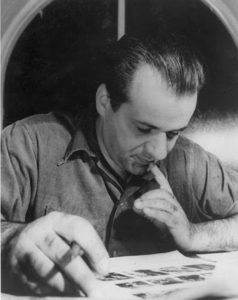
Ben Burns
*Ben Burns was born on this date in 1913. He was a white Jewish-American newspaper and magazine editor.
Benjamin Bernstein was born in Chicago to Polish Jewish parents, Alexander and Frieda Bernstein. The family lived on Chicago's Near West Side at the time of his birth at Michael Reese Hospital. He grew up in the slums of Chicago. His father was a house painter originally from Łódź. His mother was born in Warsaw. His mother divorced Alexander when Burns was a year old and married Nathan Denison, a Chicago produce dealer. Esther Burns' parents also lived in Chicago.
Burns spent his teen years in New York's West Side, graduating in 1930 from James Monroe High School. He attended New York University, where he so enjoyed working on the NYU Daily News that in 1933, he decided not to finish his senior year. Instead, he returned to Chicago, enrolling in the Northwestern University journalism program, from which he graduated in 1934. In 1935, he joined the Young Communist League until he was expelled in 1948. During this time, he married Esther Stern on November 28, 1937. The couple, married for over 62 years, had three children.
Burns worked at three Communist newspapers in the United States: in 1937 at the Daily Worker (New York), in 1938 at the Midwest Daily Record (Chicago), and in 1940 at People's World (San Francisco). With insufficient income to support his prospective family, Burns and his wife decided it was time to move. Back in Chicago, a political connection led Burns in July 1942 to apply for a job at the Chicago Defender. Hired as a temporary fill-in editor, he remained in that field for 35 years.
Burns' previous contacts with black people had been "practically nonexistent," but he passionately threw himself into his new work. "Having committed myself wholly to Negroes' attainment of fair and equal status … I endeavored to become in every sense a 'brother' by virtue of my oneness with Negroes in values and customs, interests and concerns, reactions and resolutions," he wrote. "I became a Defender editor, a 'black newspaperman,' black in my orientation and thinking, in my concerns and outlook, in my friends and associations, black in everything but my skin color."
After time in the U.S. Merchant Marine in 1943, Burns became, during the ensuing decades, the only white editor-in-chief of a black daily (the Chicago Daily Defender, converted to a daily in 1956); the founding editor of Negro Digest (serving as editor from 1942–54); the founding (and only white) editor of Ebony (1945–54); the founding editor of Duke (1957, "a black version of Playboy"); the founding editor of Jet (1950–54), the editor of Tan Confessions (founded 1950), the editor of Sepia (1955–58, 1968–77) and the editor of Guns (1956–58). In 1952, the Chicago Defender was the second-largest weekly black newspaper in the United States (155,074). Ebony had the largest circulation monthly Black magazine (379,000), followed by Tan Confessions (200,000).
During this time, Burns often worked with publisher John H. Johnson. Burns wrote, "My communist and Defender training in protest proved a source of continual acrimony between Johnson and me for almost all the years I worked for him." Johnson contrasted the "flame of racial militancy kindled in me" with what he characterized as Johnson's "carefully calibrated racial positivism." Burns was fired from the Johnson Publishing Company in 1954. Leaving journalism, he entered public relations, partnering as a vice president from 1958-66 in the public relations firm of Cooper, Burns & Golin. In 1957, he obtained work at McDonald's. In the following year, he edited five non-black monthlies. He later served as editor of the Chicago Daily Defender (1962–67) and Sepia (1968–77).
Burns retired from journalism and public relations in 1977 and immediately traveled to Africa with his wife. Some observers question Burns' place in black journalism. "Does Burns take too much credit for the seemingly substantial work he did on Negro Digest and Ebony? I do not know," wrote one critic. "If the reader does not know the Black press well enough, it would be easy to accuse Burns of racial condescension." A statement of Burns' influence appeared in the Chicago Defender obituary, which stated that Burns, "pioneered in creating and editing the first commercially successful African American magazines and was the former editor in chief of the Chicago Defender who trained many Black writers in all phases of print journalism."
The documentary record he accumulated during those years and later donated to the Chicago Public Library is a "gold mine" of information on the history of Black journalism. "For students of African American history and Black journalism," the Defender editorial stated about the Burns papers, "it is a collection that demands to be seen." In 1997, Burns was in the Hall of Achievement at Northwestern University's Medill School of Journalism. Ben Burns died on January 29, 2000.